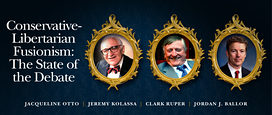Shockingly, dedicating a month to the discussion of libertarian-conservative fusionism has not resulted in agreement. It has, however, articulated some excellent arguments and, in my view, proved one point of my opening essay – that libertarians and conservatives should collaborate where they can to reach young people for the preservation of freedom.
To this end, I utterly reject Clark Ruper’s position that libertarians might have more in common with modern liberals than with conservatives. Certainly liberals today celebrate individual liberty in specific social issues, and if libertarians want to align with liberals in these limited areas, that is understandable. But concessions of personal choices by modern progressives are nothing more than Huxleyan opiates designed to appease and entertain while the fundamental structures of our freedom are destroyed. There is nothing about modern liberalism that ideologically matches the holistic approach to freedom that defines libertarianism.
The key word here is “modern.” The discussion in this forum has delved deeply into the intellectual traditions of libertarianism, conservatism, and liberalism in an impressive fashion. But this escape pod of knowledge is rocketing away from our modern, 21st-century reality. I have argued that libertarians and conservatives believe we stand on the intellectual shoulders of giants, and I think the impressive name-dropping of historical figures here bears it out. We know the ideas of Augustine, Rousseau, Burke, Locke, Hume, Smith, Mill, Aquinas and more recently Rand, Rothbard, Kirk, Buckley, and the Pauls. We have studied, and we will work to improve our society based on both their mistakes and on what they got right.
This is not an activity shared by the modern progressives, who suffer from the arrogance of now and believe they can solve the world’s problems because we have invented the smart phone.
That young people are moving away from conservatism is correct, but it misses the larger picture that young people are moving away from caring about politics at all. The minority that does care about politics is indeed rejecting conservatism in favor of libertarianism or progressivism. This is not because of their understanding of the intellectual history articulated in this forum by my colleagues – it is because they reject the modern standard-bearers for conservatism. They are embracing the opiates of personal choice, which they find in libertarianism and modern progressivism.
Ruper at one point says, “If we take a longer view of history, we may very well find ourselves looking back at fusionism 100 years from now as a quaint historical accident.” In the same spirit, I agree that a few generations hence will not know or care much about libertarian-conservative fusionism. This is because in my worst dystopian fears, our children’s children don’t know anything about freedom. The prophetic warnings of authors such as Huxley, Bradbury, and even Rand are that humanity will settle for tyranny far too easily if they don’t understand and value freedom.
To quote C.S. Lewis, as conservatives are wont to do, “We are half-hearted creatures, fooling about with drink and sex and ambition when infinite joy is offered us, like an ignorant child who wants to go on making mud pies in a slum because he cannot imagine what is meant by the offer of a holiday at the sea. We are far too easily pleased.”
To those who say that fusionism is possible between modern progressives and libertarians, and to those who want to reject conservatives for simply believing in virtue, I would say that you are far too easily pleased.
Now, those who are familiar with Lewis know that he is not putting away all temporal things, but he is making a very Christian argument, similar to Jordan Ballor’s argument, that individual freedom ought not to be our end goal. He is saying that we should strive to use our freedom to pursue good. Jeremy Kolassa points out accurately that not all libertarians and conservatives are in agreement about how to define “good.” The point to keep in mind, though, is that we can continue to debate what free people ought to do, but we should agree that people ought to be free.
I challenge you to adopt a modern concept of fusionism, one that focuses on the structure of limited government and freer markets within which we can debate personal choices. Let fusionism perhaps even be forgotten in time, as long as freedom does not become a footnote in history.

